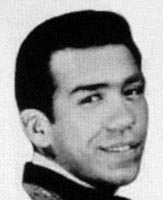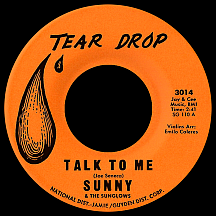SUNNY AND THE SUNGLOWS
Talk To Me
San Antonio high school students Ildefonso Ozuna and Rudy Guerra started their own band, The Galaxies, in the late 1950s. Ozuna, known to family and friends as "Sunny," was initially inspired by Tejano, the Mexican folk music originated by Latino immigrants in Texas, but he had a bias towards the rock, R&B and country music of the U.S. Rebelling as most teenagers did, he shunned the more traditional music of his elders, intentionally setting out to be a rock and roller. Soon after, Rudy's brother Manny Guerra formed The Sunglows with a varying (usually large) lineup of musicians; the instrumental band needed a singer and Sunny signed on.
Sunny and Rudy comprised the core of the Sunglows circa 1960, in addition to saxophonist Gilbert Fernandez, bassist Tony Tostado, organist Alfred Luna, guitarist Oscar Villanueva and his brothers, sax player Ray and drummer Jesse. As Sunny and the Sun-Glows, the band released "Just a Moment," a swampish-sounding soul ballad with heavy sax, produced by Manny Guerra for the Kool record label. They removed the hyphen from the band's name and began pressing records on their own label, Sunglow, in 1962; "Golly Gee" received strong enough airplay in San Antonio and other parts of the Lone Star state that Okeh Records picked it up for national release. But the timing wasn't there...yet. Enter Louisiana music entrepreneur Huey P. Meaux, "The Crazy Cajun," who'd already scored big with Jivin' Gene ("Breaking Up is Hard to Do") and Barbara Lynn ("You'll Lose a Good Thing"). He made a deal with the group to record for his Tear Drop label - which resulted in just one song. Only the A side of the group's debut with Meaux gave credit to Sunny and the Sunglows...but it was the side that counted.
"Talk To Me" was penned by Joe Seneca (who also cowrote Brenda Lee's 1962 hit "Break it To Me Gently" and worked as an actor from the '70s to the '90s, appearing in dozens of films and television episodes). The song had already been a hit for Little Willie John in 1958 as "Talk to Me, Talk to Me." Sunny's string-drenched recording had a younger feel than the pop-styled original by John (though coincidentally both singers were 20 at the time of their respective versions); his delivery came across as more confident than his similar, but less polished, earlier efforts. It was a huge hoped-for hit in the southwest and developed from there, reaching the top ten on the Cash Box chart at the beginning of November 1963, just after hitting number eleven on Billboard's pop chart. Yet the triumph was bittersweet, for the Sunglows at least. By the time the record was released, Sunny had already left the group over differences with the band and his own singular ambitions; the flip side, in fact, was by Sunny and the Sunliners, a new group he assembled immediately after the split.

Ozuna stayed with Meaux and his Tear Drop label, while the Sunglows continued as a separate instrumental outfit with as many as ten group members at a time. At Huey's suggestion, Sunny and the Sunliners followed "Talk To Me" with "Cariño Nuevo" ("New Love"), aimed at the Spanish-speaking audience Sunny had previously avoided; turns out Meaux knew what he was doing, but it would take a little time to prove his point. The mainstream follow-up came next, and it was another remake of an older song, "Rags to Riches" (a 1953 chart-topper for Tony Bennett), a mid-chart hit in December '63. With this and the next record, "Out of Sight, Out of Mind" (reviving The Five Keys' classic from '56), Sunny's singing took on a softer, smoother sound indicating a maturity while lacking the more brazen vocal appeal of "Talk To Me."
The Sunglows continued putting out records on the Sunglow label. In early 1965, a reissue of "Peanuts (La Cacahuata)," an instrumental "Latin Polka" written by Luis "Louie" Guerrero, made some noise. It had been released a few years earlier on Casa Grande (a label Louie also recorded for). The traditionally-arranged recording hit the pop charts in May, giving the band cause for relief where Ozuna's defection was concerned. Guerrero cashed in big as the song's author when Herb Alpert's Tijuana Brass included their version on the multi-million-selling album Whipped Cream and Other Delights. More Sunglows instrumentals resulted, some of them Mexican standards and others original rock-style tunes. Joe Bravo came on board to take Sunny's place as lead singer and, under the guidance of producer Manny Guerra, Joe Bravo and the Sunglows achieved a special place among Tejano artists.
Though Sunny and the Sunliners (sometimes billed as Sunny Ozuna and the Sunliners) had no further national success, their star rose throughout the southwest, despite Sunny's egocentric stabs at grandeur (he created nicknames for himself like "El Consentido," suggesting he was Tejano music's favorite son). Meaux's advice about recording the music of his heritage had been an important one, though; over the years, as he and the band released many Spanish-language discs (in between his Tex-Mex rock and roll records), Ozuna's popularity grew ever larger with Tejano music fans unfazed by his overconfidence, or perhaps attracted by it. At any rate, his ultimate acceptance of his Mexican roots has had more impact on his long-running career than "Talk To Me," the song he's primarily known for outside the domain of Tejano music.


